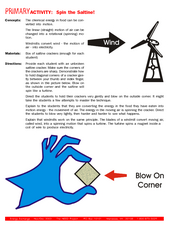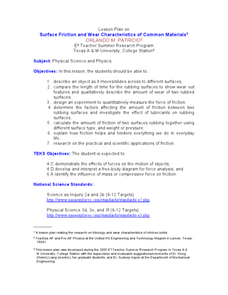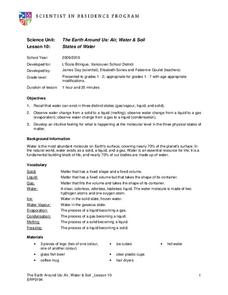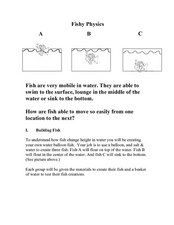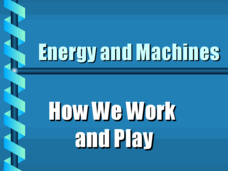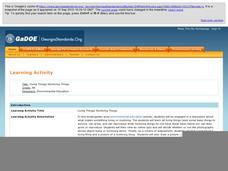Curated OER
Outcomes Science 4
In this outcome science 4 worksheet, students apply scientific knowledge to answer and calculate a variety of questions. Students research the answer to several questions using the websites suggested.
Curated OER
Spin the Saltine!
Students investigate chemical energy. In this physical science lesson, students blow on saltine crackers to demonstrate how chemical energy in food can be converted to motion. Students compare the saltine cracker experiment to how...
Curated OER
Surface Friction and Wear Characteristics of Common Materials
Students identify the factors affecting friction. In this physics lesson, students construct their own rocket car and race them. They graph the average speeds and discuss how lubricants affect friction between rubbing surfaces.
Curated OER
Where Are The Dinosaurs?
Students examine the concept of extinction in relationship to the dinosaurs. In this elementary science lesson students become familiar with dinosaurs and that they are extinct. Students differentiate between different types of dinosaurs.
Curated OER
States of Water
Students investigate the 3 states of matter. In this physical science "matter" lesson, students observe and participate in a number of demonstrations involving melting and freezing water. Students observe the effect heat has on changing...
Curated OER
Concrete Research
Students explore concrete. In this physical science and computer research instructional activity, students work in groups to answer specific questions about concrete. Each group of students completes a different worksheet with a...
Curated OER
Hatching Chickens
Students observe chicks hatching from eggs. In this science lesson plan, students view a video to develop an understanding of the proper care and needs of eggs and live animals. This is a great precursor activity for hatching eggs in class.
Curated OER
What's The Scoop?
Students explore the properties of matter. In this cross curriculum three states of matter science lesson, students listen to the poem "Eighteen Flavors" by Shel Silverstein, and predict what will happen if listed ingredients are...
Curated OER
Sounds Good to Me
Students determine density and hardness of wood samples based on several investigations. In this physical science and music lesson, students visit four centers and perform tests on wood samples to determine densities and hardnesses. They...
Curated OER
Where Are the Dinosaurs?
Students investigate dinosaurs. In this life science lesson, students watch video clips on the website http://dsc.discovery.com/convergence/dinos/video/video.html and discuss the characteristics of the dinosaurs. Students create dinosaur...
Curated OER
Public and Private
Students list places that are considered private and public. In this health science lesson plan, students discuss behavior appropriate for each setting. They complete the assigned checklist.
Curated OER
Sand & Water: Arctic in the Sun
Students chill out on a hot day with this outdoor activity. For this early childhood physical education lesson, students have fun experimenting through play with ice and toy animals in water.
Curated OER
Fishy Physics
Learners explore how fish are able to move easily from one depth to another in water. In this fish instructional activity students create their own balloon fish.
Curated OER
Muscles, Oh My!
Pupils explore the human muscular system. For this science lesson, students discuss how engineering is related to the field of bio-mechanics and human movement.
Curated OER
Basic Needs of Living Things - Lesson Two
Fourth graders study and identify the basic needs of a variety of organisms. Terrariums and aquariums are used to demonstrate what plants, animals, and fish need to stay alive. These two classic models are used to effectively convey what...
Curated OER
Basic Needs of Living Things - Lesson One
An interesting way of teaching about basic needs of different organisms awaits your fourth graders. Pupils take part in class discussions and demonstrations which should lead to a greater understanding of how to determine basic needs. As...
Curated OER
What Do Your Know About Matter?
Perfect for 1st grade students, this presentation contains information on the various states of matter, what affects them, and how they change. Using clear language and simple images, these slides will be there to guide any lesson or...
Curated OER
Was Kepler Correct?
Students are introduced to Kepler's 2nd law of Planetary Motion. The instructional activity reinforces the understanding of focal points. They calculate the sector area of an ellipse.Students expand understanding by modeling Kepler's 2nd...
Curated OER
Energy and Machines: How We Work and Play
Energy and machines are two things that belong together. This resource provides a clear and simple overview of energy, force, work, and machines. Because the information in this presentation is clear and well-organized it would...
Curated OER
Design Your Own Rollercoaster
Here is a physics lesson that your 5th graders should love. They explore the physics behind roller coasters by viewing roller coaster simulations online. Then, they work in pairs in order to design their own roller coasters and track....
NASA
Einstein's Gravity
Assist your high school class with researching and applying the principles of gravity so they may further understand why Einstein is so widely recognized, even today. Individuals compare and contrast two different models that demonstrate...
Curated OER
What are Igneous Rocks and How are They Formed?
Crystals form before your very eyes! What sixth grader wouldn't enjoy this lesson plan on igneous rock formation? Using hot Salol, junior geologists observe the crystal formation process as the material cools. This comprehensive lesson...
Georgia Department of Education
Living Things/ Nonliving Things
How can you tell if something is living or nonliving? Introduce a set of criteria which can be used to determine which things are alive and which are not. The class discusses the basic needs of all living organisms, checks out an...
Code.org
Sending Binary Messages
Pairs build a device that will be able to send a binary message. They then update their device to allow it to send four possible messages before upping the ante to eight. The provided self-assessment rubric comes with reflection...



